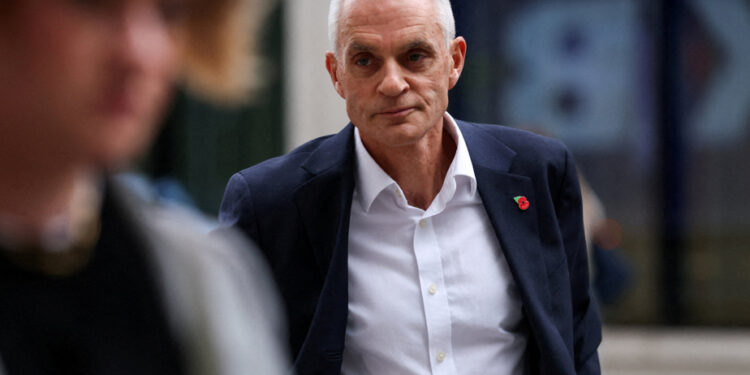(London) The resigning director general of the BBC Tim Davie on Tuesday called on the group to “fight” to defend its journalism, after Donald Trump’s threats to sue the British public audiovisual group for defamation for a misleading montage of one of his speeches.
“We must fight to defend our journalism”, “we are a unique and valuable organization, and I see the freedom of the press being put to the test,” said Tim Davie, who spoke for the first time to BBC employees since announcing his resignation on Sunday due to the controversy.
He also admitted “a breach of our editorial rules” to employees.
The US president’s lawyers have given the BBC until Friday 5 p.m. (Eastern time) to apologize and withdraw the documentary including the misleading montage broadcast at the end of October 2024.
Failing this, they will seek one billion dollars in damages in court, according to the letter they sent to the BBC.
The audiovisual group, shaken in recent years by several controversies, affirmed that it would respond to this letter “directly in due time”.
The chairman of the BBC board, Samir Shah, apologized to the BBC on Monday and acknowledged “an error of judgment”, without directly addressing Donald Trump.
The affair has already cost the director general Tim Davie and the boss of the BBC News channel, Deborah Turness, their jobs.
PHOTO HENRY NICHOLLS, AGENCE FRANCE-PRESSE ARCHIVES
BBC News boss Deborah Turness has resigned
“Fiercely independent”
The controversy is also embarrassing for Keir Starmer’s Labor government, which prides itself on having established good relations with the Trump administration.
The Minister of Culture, Lisa Nandy, paid tribute to the BBC on Tuesday afternoon before the deputies, but carefully avoided talking about the American president’s threats.
While recognizing the existence of “serious problems” in the functioning of the BBC, she called for avoiding “sustained attacks” on an institution “at the heart of our democratic and cultural life for over a century”.
The government spokesperson also refused to comment on possible legal action. “It is up to the BBC to answer editorial questions, and we have a close relationship with the United States on our shared priorities,” he stressed.
This affair comes at a time when the audiovisual group, which derives most of its income from royalties, must renegotiate its ten-year mission contract with the government by the end of 2027. The review of the contract will start “before the end of the year”, announced Lisa Nandy in parliament.
“We will ensure that the BBC benefits from sustainable funding”, which will allow it to remain “fiercely independent”, promised the minister.
“Attacks” from the right
The affair exposed growing tensions within the BBC’s board, which is partly appointed by the government.
Some on the conservative right accuse news programs of being biased on topics like the war in Gaza, transgender rights and Donald Trump.
The Conservative MP responsible for culture, Nigel Huddleston, again judged on Tuesday that the treatment of news at the BBC had “real problems, and in particular does not respect its duty of impartiality”.
For former BBC chairman Richard Tait, this media is the subject of “relentless attacks” from the Conservatives and the far-right Reform UK party, which have “contributed to undermining public confidence”.
Donald Trump has increased threats and lawsuits against the American media, but proceedings against the BBC would be difficult to defend in court, according to several experts.
The US president plans to open proceedings in Florida, where he lives, as the deadline of one year after the alleged offense to file a defamation complaint in the United Kingdom has passed.
American law is more protective of freedom of expression, and the BBC has only a “very small audience” in the United States, lawyer specializing in media law, Matthew Gill, told AFP.
On the other hand, it allows you to claim much greater damages.



